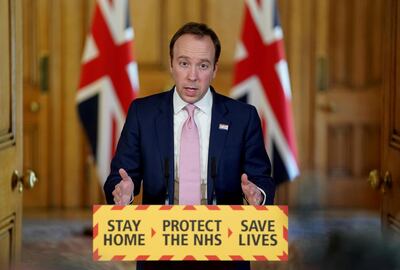There’s always a bit of poetry for every occasion, and according to the Irish writer Fintan O’Toole it is often from his fellow countryman, WB Yeats. Now with coronavirus, Yeats’ most famous lines written after Ireland’s 1916 Easter Rising have a peculiar resonance: “all is changed, changed utterly.”
Our way of life this Easter has indeed changed utterly here in keep-your-distance Britain. The big and unanswerable question is: what will change in the long term? Medical care? Preparedness for another pandemic? The way we work? As I walk down the normally very busy local roads and notice how empty they are, it is quite possible that it will be the way in which we connect that is “changed utterly".

The British government is preparing to devote billions - perhaps £100 billion - to the HS2 project, the new railway line that will connect London with the north of England. It also wants a £27 billion road-building programme and is (somewhat reluctantly) in favour of another runway for Heathrow Airport.
But one of the key voices in what is sometimes called the “road lobby,” the Automobile Association, has suggested something quite different. The head of the AA, Edmund King, wondered whether all this expansion, particularly the money for roads, could be better spent on a different part of our infrastructure - broadband. He said, “arguably in future, we should invest more in broadband because what this current crisis has shown is that the majority of companies can continue working from home, and it can be more efficient.”
For those lucky enough to be able to work from home, that may be true. Although, millions of us have jobs in which we will still need to go to the factory, office, warehouse, supermarket or other place of work. Even so, a friend just mentioned to me that one of the big players in the publishing industry has found that tele-conferencing apps worked so well that they may not need to continue renting their very expensive central London offices.
An investment company has recently sent a notice to clients warning that a property fund had “suspended trading until further notice…. We’ve been informed that the UK valuer community has invoked the ‘Uncertain Market Valuation Clause’, which means that at present they don’t believe they can provide accurate valuations on UK commercial properties in current market conditions.”
Some of those enormous new office blocks that have been erected in the centre of London are already empty because people are working from home. When the coronavirus pandemic finally draws to a close, those same buildings may never recover the occupancy rates their investors initially expected. A few years ago, I made a radio programme on the world’s tallest buildings, and one of the property experts I spoke to made a surprising point. He said that, from the Empire State Building to the Twin Towers or the Burj Khalifa, these beautiful landmarks tend to be commissioned in good times, but building them takes so long that they very often open during a downturn in the economic cycle.
The Burj Khalifa opened in 2010 during the recession following the 2008 global financial crisis; the Empire State Building opened in 1931 as the world entered the Great Depression. Of course, those building projects will exist long enough to survive many ups and downs of the economic cycle, but undoubtedly the property market is taking a negative turn. Perhaps Edmund King is right. Governments worldwide will recognise that investing in better connectivity through broadband is likely to have greater economic impact in the future than digging a lot of new roads, or building more airports, and environmental benefits will be far greater, too.
The changes we face may go from the biggest construction projects to how we look after ourselves - washing our hands often, being careful with our health. I bumped into a neighbour, a man who has always been very careful of his appearance, and his hair was extremely short.
“I can’t go to the hairdresser,” he said, explaining that he bought an electric shaver and did the job himself. “I may never go to the hairdresser ever again.”
Another local shop serves customers at the doorway, and when I went to collect an order I noticed a large box of matches where I picked up my shopping bag. The shop owner explained she put them there “so people can tap in their credit card number without touching the machine.”
These are obviously difficult times for anyone whose work depends upon personal contact, and I doubt we are seeing the end of working in offices. The property market, like the stock, market will recover. But maybe nothing truly will ever be the same, except human ingenuity and the need to stay connected to one another. Broadband is now like electricity - not a luxury, but a necessity - and for many of us it may indeed be more important that new roads, railways or runways. All is changed, changed utterly. Let’s make sure the changes are for the better.
Gavin Esler is a journalist, author and presenter























